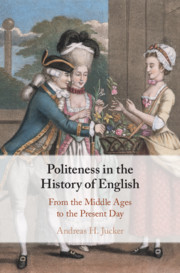Book contents
- Politeness in the History of English
- Politeness in the History of English
- Copyright page
- Contents
- Figures
- Tables
- Preface
- 1 Exploring Politeness in the History of English
- 2 Research Methods and Data Problems
- 3 Medieval Britain
- 4 Terms of Address in Middle English
- 5 Renaissance and Early Modern England
- 6 Terms of Address in Early Modern English
- 7 The Eighteenth Century: The Age of Politeness
- 8 The Eighteenth Century: Educational Literature
- 9 The Rise (and Fall) of Non-imposition Politeness
- 10 Conclusion: Politeness, Manners and Dissimulation
- References
- Index
8 - The Eighteenth Century: Educational Literature
Published online by Cambridge University Press: 27 March 2020
- Politeness in the History of English
- Politeness in the History of English
- Copyright page
- Contents
- Figures
- Tables
- Preface
- 1 Exploring Politeness in the History of English
- 2 Research Methods and Data Problems
- 3 Medieval Britain
- 4 Terms of Address in Middle English
- 5 Renaissance and Early Modern England
- 6 Terms of Address in Early Modern English
- 7 The Eighteenth Century: The Age of Politeness
- 8 The Eighteenth Century: Educational Literature
- 9 The Rise (and Fall) of Non-imposition Politeness
- 10 Conclusion: Politeness, Manners and Dissimulation
- References
- Index
Summary
This chapter takes a careful corpus-based look at the politeness vocabulary of the eighteenth century. It starts with a wide-angle perspective of the terms politeness, civility and courtesy in general-purpose corpora before moving on to a more detailed analysis of a larger selection of politeness- and impoliteness-related lexical items in a dedicated corpus of eighteenth-century epistolary novels by Samuel Richardson and Fanny Burney. In the second part of this chapter, two case studies are devoted to the sentimental comedy The Conscious Lovers by Richard Steele and the domestic tragedy The London Merchant, or The History of George Barnwell by George Lillo. Both plays have a strong and explicit educational intent. They want to instruct and entertain and help their audiences to become better human beings who rise above the mere observance of rules of etiquette.
Keywords
- Type
- Chapter
- Information
- Politeness in the History of EnglishFrom the Middle Ages to the Present Day, pp. 135 - 159Publisher: Cambridge University PressPrint publication year: 2020

